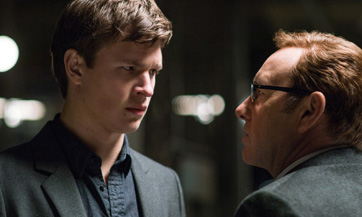Movie Review: Baby Driver
By Steven Slater
July 11, 2017
BoxOfficeProphets.com

Baby is the getaway driver for a mastermind named Doc, played by Kevin Spacey. Doc assembles a different crew for each heist, but Baby is always his driver, his good luck charm. But for some reason, Spacey assembles a dream team of previous members for a major operation, with Jon Hamm, Jamie Foxx and Eiza Gonzalez providing the big guns. You can bet there is some serious scenery chewing between all of them. Baby, meanwhile, is played by Ansel Elgort with a real baby face, acting almost catatonic in front of these gruff, intimidating criminals. He is just trying to stay under the radar, pay his debt to Doc, and get out alive. Unlucky for him, of course, is that Doc considers him his good luck charm, even after the debt is paid.
Now, you can’t have a film like this without a love interest (“with a little sex in it”), and Baby happens to meet just the right woman at the diner his deceased mom used to work at. Her name is Deborah, played by Cinderella herself, Lily James. So of course, when she sings a little tune and takes his order, he is smitten. It is probably the only moment where Baby loses his cool facade. And wouldn't you know it, she gets tied up in his schemes with Doc, so that the thing Baby loves most is threatened, along with his deaf roommate, an old black man. I think by now you know exactly what kind of movie this is. That’s another Tarantino trait Wright has; deliver exactly what your audience wants to see. Wright knows the movie he is making, and he succeeds at making it.
As for the slightly off-kilter ending, I think the purpose of it is to say that Baby is a good person deep down, and that’s what makes him different from all these other criminals. It certainly feels weird, but perhaps that is the one moment of character that is outside Wright’s picture of pure style. Elgort is certainly able to keep his own throughout the film, even next to a thespian of Spacey’s caliber, but for most of the film he seems to be portraying Wright’s ideal version of the cool driver (like the male counterpart to the manic pixie dream girl). At the end, though, even if just for a minute, he seems to be able to dwell in his character.
Ultimately, while I can appreciate style, and especially be in awe of the technical merit of maintaining it throughout a feature, I can only take so much. I thought Hateful Eight was too self-indulgent, and Baby Driver suffers the same fate. Baby Driver is probably exactly the film Edgar Wright loves watching, and a lot of his fans may feel the same way. For myself, I need something mixed in with the style, even just a little. With Tarantino, his early efforts still had characters that stood on their own, outside his style. With Wright, he likewise had characters that stood on their own (it helps to have great buddies like Simon Pegg and Nick Frost). With Baby Driver, I kind of wish someone else had written the script and characters and Wright had put them in the film he wanted to see. As it stands, the film is very good, but it was not completely satisfying for me. The music is pretty damn good, though.
Slatergrade: B+